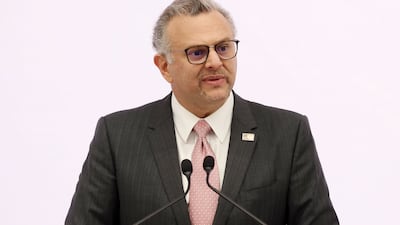Those of us wishing for a quiet start to 2026 were disabused of that hope this weekend, as US forces detained Venezuelan leader Nicolas Maduro in Caracas.
The long-time Venezuelan president appeared in a New York court after his capture, pleading not guilty after the US indicted him on drug and weapons-related charges. He's being held in a jail in Brooklyn, with his next hearing to come in mid-March.
Mr Maduro's capture has sent shockwaves throughout the world, with many countries slamming the move as a violation of international law. Concerns are high in Latin America that the US may not stop there, but will also intervene in other countries in the region.
Washington has said it will be taking control of Venezuela's troubled oil industry. US forces have seized tankers off the Venezuelan coast believed to be carrying sanctioned oil. The latest tanker, the Russian-flagged Marinera, was seized yesterday after breaking through Washington's maritime blockade more than two weeks ago. The tanker was previously under sanctions for involvement in the Iranian oil trade.
The Venezuela situation has made Russia and Iran decidedly nervous. Tehran in particular is in a vulnerable situation after US strikes in June took out its nuclear programme, and domestic protests are testing the regime's fortitude. President Donald Trump warned Iran last week that the US is "locked and loaded" if Tehran violently suppresses the protests.
The US military action against Caracas has drawn comparisons to the invasion of Iraq, but Pentagon chief Pete Hegseth called the Venezuela situation the "exact opposite" of that situation – whatever that means.
Mr Trump came into office claiming to be a peacemaker, but it's unclear to me how bombing a foreign country, arresting its leader, taking control of its natural resources and issuing threats to other nations in the region deemed to be unfriendly is making peace.
Eye on the White House
Military 'always an option' for US to acquire Greenland, White House says

The White House said this week that Mr Trump and his team are considering several options, including the use of the military, to “acquire” Greenland.
The status of the vast, mineral-rich island has drawn renewed attention after the Trump administration repeated its desire to control the territory, which has been part of the Danish realm for centuries.
Mr Trump has talked about taking Greenland since 2019, saying it was vital for the US military, and that Denmark had not done enough to protect it. He returned to the topic this week after the attack on Venezuela.
“President Trump has made it well known that acquiring Greenland is a national security priority of the United States, and it’s vital to deter our adversaries in the Arctic region,” White House press secretary Karoline Leavitt said.
“The President and his team are discussing a range of options to pursue this important foreign policy goal, and of course, utilising the US military is always an option at the Commander-in-Chief’s disposal.”
What's Washington talking about?
Epstein deadline Members of Congress from both sides of the aisle have called out the Trump administration for missing the deadline to release files related to the case of disgraced financier Jeffrey Epstein, who died in jail awaiting trial for sex-trafficking charges. "It’s been 17 days since the Trump [Department of Justice] first broke the law and failed to release all the Epstein files," Senate Minority Leader Chuck Schumer said on social media. "What are they trying to hide?”
White House whitewashing On the fifth anniversary of the January 6 Capitol insurrection, the White House put up a page on its website giving its own version of the day's events. The page hails Mr Trump for pardoning people convicted of involvement in the riot, calling them "unfairly targeted, overcharged and used as political examples". "The Democrats masterfully reversed reality after January 6, branding peaceful patriotic protesters as 'insurrectionists' and framing the event as a violent coup attempt orchestrated by Trump," it states.
More military spending? Mr Trump said yesterday that next year's defence budget should be $1.5 trillion, a 50 per cent increase that would result in America having a “dream military". The US already spends more on its military than the next nine countries combined. He said the additional expenditure would be paid for by revenue from tariffs.
Spotlight: Unease at UN after US seizes Venezuela's Nicolas Maduro

The UN has been marked by unease and quiet division after the dramatic US operation in Venezuela, with UN diplomats questioning both the legality of the action and the relevance of the multilateral system in restraining such a force.
In the corridors of the UN's New York headquarters, envoys speak of a sense of paralysis after US forces seized Mr Maduro in Caracas.
Publicly, most UN member states have limited themselves to cautious statements calling for respect for international law. Privately, however, diplomats say the episode has deepened concerns that the Security Council is increasingly sidelined when major powers act unilaterally, and that the US operation sets a precedent for cross-border arrests of political leaders that could have ramifications for international law.
An emergency Security Council meeting was requested by Venezuela this week, and formally conveyed to the council by Colombia, whose UN ambassador, Leonor Zalabata Torres, argued that the capture of Mr Maduro risked allowing “the law and the interests of the strongest” to prevail over multilateralism.
Only in America
US cuts broad recommendation for four childhood vaccines, including for flu

The US on Monday ended its long-standing guidance that all children receive vaccines against flu and three other diseases, a sweeping change that advances one of Health Secretary Robert F Kennedy Jr's long-term goals.
Public health experts warn the latest withdrawal could lead to preventable hospital admissions and deaths.
The action removes the recommendation for rotavirus, influenza, meningococcal disease and hepatitis A vaccines, and states that parents should consult healthcare providers under what it calls shared clinical decision-making.
Last month, Mr Trump urged the US to “align with other developed nations” by reducing the number of shots for children, and has said the new schedule is "rooted in the gold standard of science".
Mr Kennedy, a prominent vaccine critic, has previously led efforts to drop universal recommendations for Covid-19 and hepatitis B shots for children, citing links to autism that scientists have repeatedly debunked.
-Reuters
Read more
The National produces newsletters across an array of subjects. You can sign up here. To receive The Editor's Briefing, our Editor-in-Chief's weekly newsletter that rounds up the top stories, sign up here.



